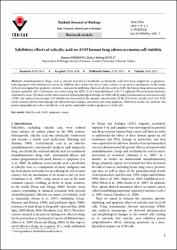Inhibitory effects of salicylic acid on A549 human lung adenocarcinoma cell viability
Özet
Antiinflammatory drugs, such as salicylic acid and its metabolite acetylsalicylic acid, have been singled out as apoptosis-inducing agents with antitumoral activity. In addition, they reduce the risk of some cancers via an unclear mechanism. In this study, we have investigated the apoptotic, cytotoxic, and growth-inhibiting effects of salicylic acid on A549, the human lung adenocarcinoma, alveolar epithelial cells. Cytotoxicity was tested using the MTT (3-(4,5-dimethylthiazol-2-yl)-2,5-diphenyl-2H-tetrazolium bromide) colorimetric assay. We observed the ultrastructural and morphological changes in A549 cells by using transmission electron microscopy (TEM) and confocal microscopy. Cell viability was decreased by the optimal concentration (IC50) of 6.0 mM salicylic acid. Our TEM results showed cell structure damage and ultrastructural changes, concretely indicating apoptosis. With these results, the cytotoxic and potent antiproliferative effects of salicylic acid can be concluded to induce apoptosis in A549 cells.


















